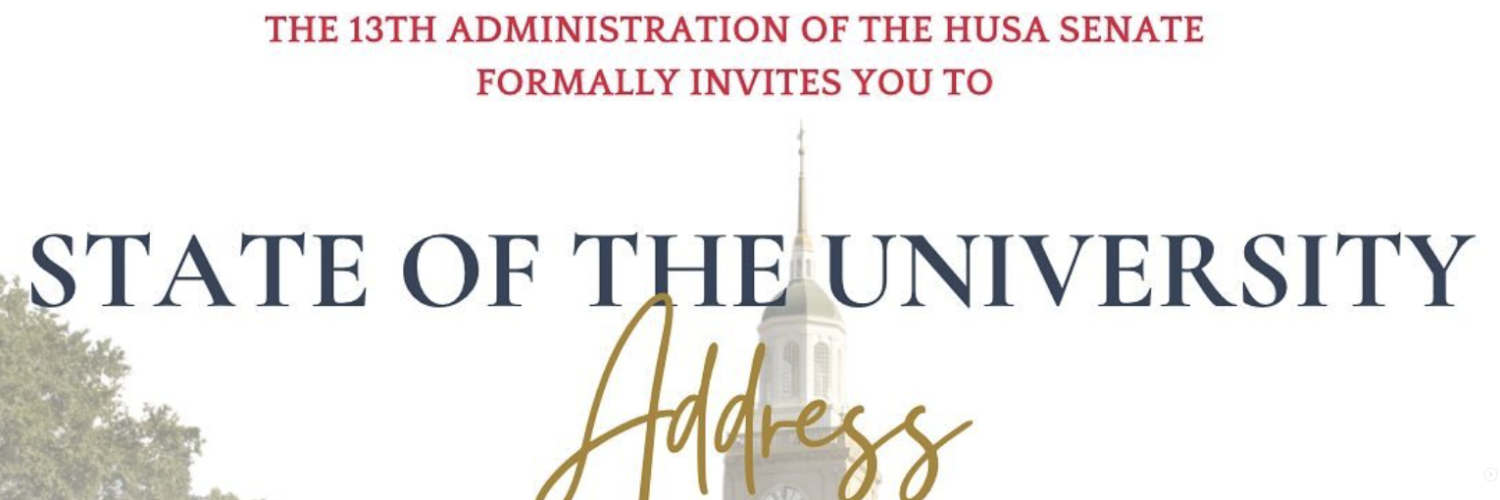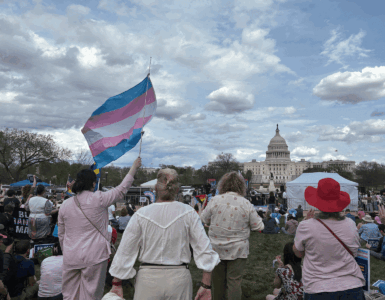Howard University Student Association graphic, “The 13th administration of the HUSA Senate formally invites you to the State of the University Address” (Courtesy /HUSA Senate)
On Wednesday, Sept. 4 at 7 p.m., the 13th Administration of the Howard University Student Association (HUSA) Senate held its State of the University Address at Douglass Hall. Representatives from the executive and legislative branches, the elections committee, the Undergraduate Student Assembly (UGSA) and the Graduate Student Assembly (GSA) took the time to highlight their recent accomplishments, current projects and future initiatives.
While much progress was made, the overarching message was clear: more work lies ahead, and HUSA remains committed to transforming the university environment.
Here are five key takeaways from the event.
- Elections Commissioner Tyla McAffity highlighted the need to emphasize the importance of student elections and boost student engagement.
HUSA’s election committee has worked in the past to streamline the election process with the implementation of the ElectionBuddy software. Although the new software reduced system errors on election day and made the voting process easier for students, participation in the voting process remains a significant challenge.
“In the past, we have only had a small percentage of the student body actually voting in elections—averaging 15% since the beginning of the use of the ElectionBuddy software,” said Elections Commissioner McAffity.
This year, the commission’s focus will be on expanding student voting engagement through programming collaborations with other HUSA branches and increased use of social media to educate students on the importance of voting.
McAffity expressed her personal commitment to the cause, stating,“It is my goal to ensure that all students are heard and valued during our democratic process.”
- Maia Patterson, the coordinator of UGSA, outlined her committee’s mission to strengthen the undergraduate community stating, “The goal for this year is to establish traditions and build relationships.”
With Howard welcoming its largest freshman class ever, the UGSA hosted a successful Bison Week and plans to introduce even more campus events to engage students throughout the academic year.
Notable traditions they plan to implement include First Friday — a monthly event filled with music, games and community bonding — pep rallies before each home game, monthly pop-up shops with the School of Business and Stress Fest – an event aimed at helping students de-stress held once a semester.
These events are designed to foster relationships, strengthen the sense of community and create lasting traditions among Howard’s undergraduates.
- GSA Coordinator Lauren Taylor spoke about the often-overlooked role of graduate students as members of the Howard community.
“Sometimes as a grad student, you can […] feel like a stepchild. We’re trying to change that,” said Taylor.
The GSA plans to accomplish this goal by enhancing resources and support for graduate students. This will be done through initiatives focused on improving academic and professional development, promoting holistic wellness and fostering a stronger student culture.
Highlights include a $20,000 Travel Fund to assist graduate students with academic and professional travel, a Graduate and Professional Organizational Fund to support student-led initiatives and a Lounge for graduate students, set to open on the third floor of Founders Library.
The GSA is also continuing the Bison Bridge Mentorship Program and plans to bring back the annual ski trip, a tradition revived last year after a hiatus since 2017.
- HUSA Executive President Jay Jones announced the “Leaders Are Built at Home” initiative, a pilot program that will introduce resident housing authorities within each dorm. This program will provide students with an advocacy branch within their residence halls and is expected to launch by the end of September.
Jones also discussed the Onward Plan, a joint effort between the student advocacy department, the public safety department and Howard University administrators to create “a standardized plan in the case of emergencies that happen at all of your residential homes.”
Jones also addressed the persistent housing crisis, emphasizing the need to create more student housing opportunities in anticipation of future enrollment growth.
- HUSA Senate Chairwoman Marlee Williams emphasized the Senate’s goal to become a more visible and accessible branch of student government. Despite being the largest branch, the Senate has struggled with visibility in the past.
“I can confidently say the most common question I’ve received as a member of the senate […] is ‘what is the HUSA senate?’,” said Williams.
This year, Williams is determined to change that by increasing the Senate’s presence on social media, seeing an increase in followers as a direct way to improve accessibility and engagement with students. Williams made her goal for the future of the senate clear, stating, “Our impact should be visible and unmistakable.”
President Jones acknowledged that the upcoming year presents a challenge, saying, “When you ask me about the state of our university, I would say that we are in a state of transition.”
Jones reaffirms her constituency, however, about the dedication of the HUSA leadership, stating, “I can assure you that the 64th administration has been working with [Howard University] administration to develop solutions.”










Recent Comments